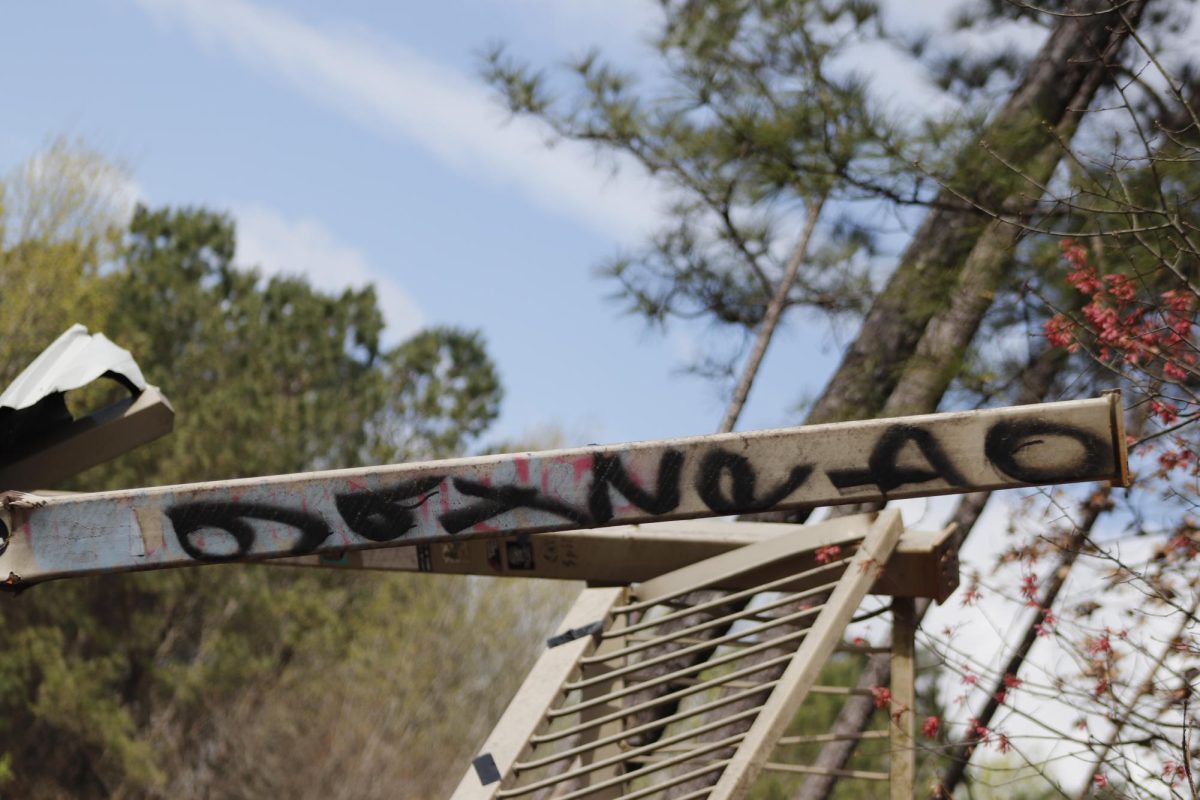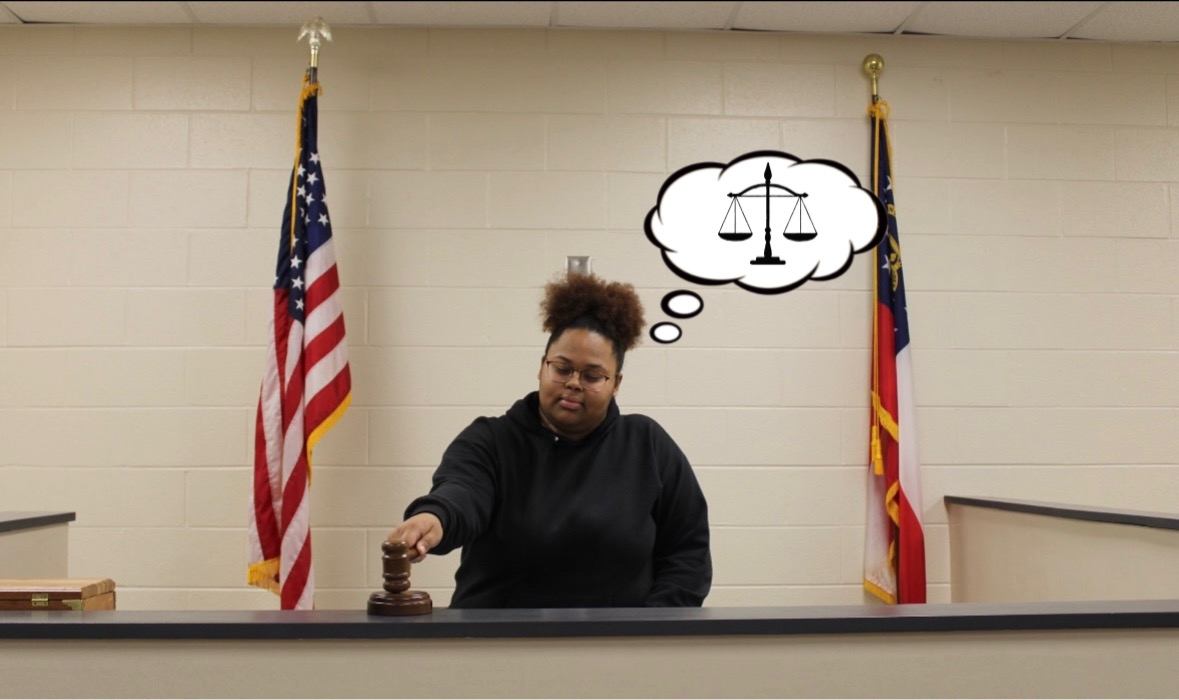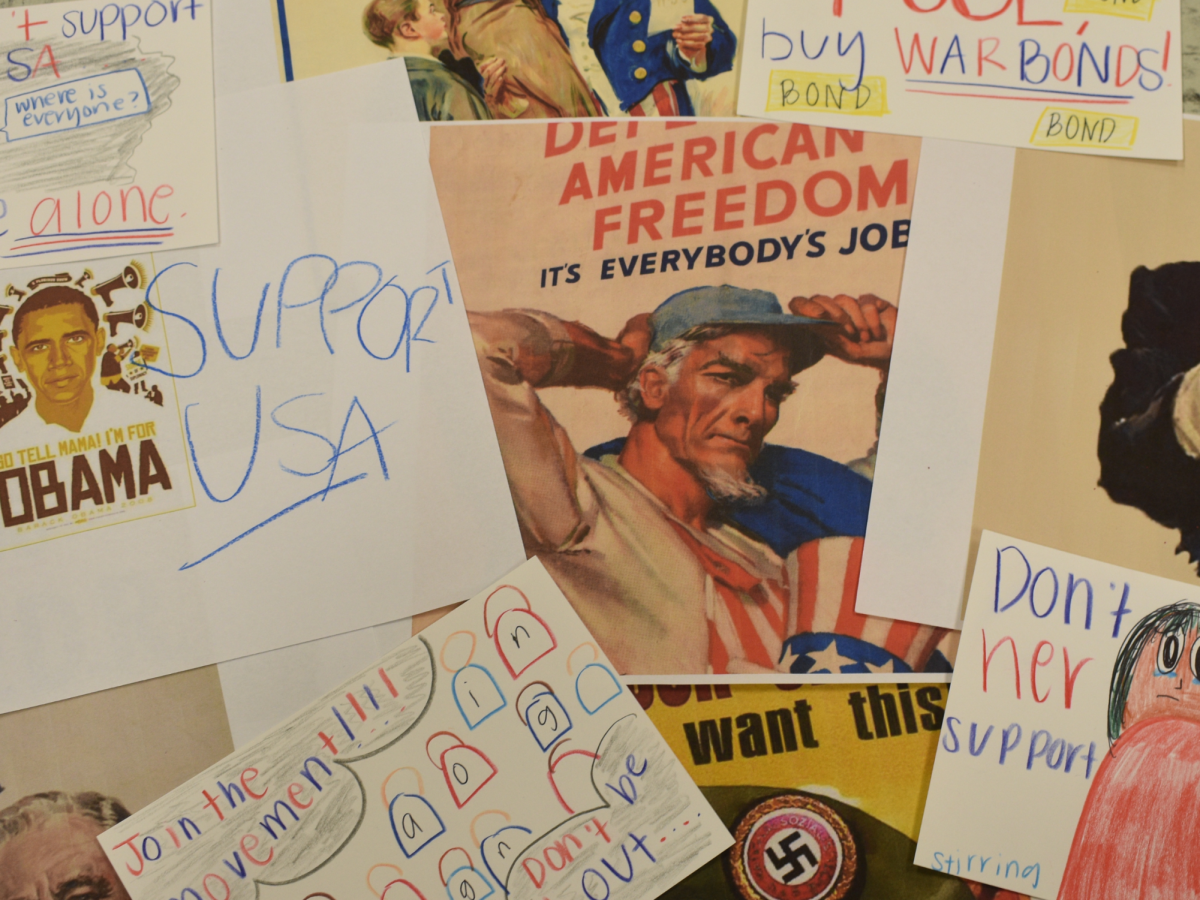The United States finds itself in a unique period for American politics. While political polarization—the growing divide between ideologies—has opened to its widest point in 50 years, hate, anti-government, extremist and fringe groups sprout nationally The majority of the radical political groups in Georgia can fall under “fringe parties,” or parties who operate outside the normal political spectrum and do not hold political office.
“Extremism in Georgia is a little different than you might find elsewhere. There are people preparing for society to collapse… Militias are preparing for an armed movement against the government,” Atlanta Journal-Constitution Deputy Politics Editor Chris Joyner said.
The growth of these groups, especially in their outreach to high school populations, poses an important role in the development of American politics. Youth groups sponsored by fringe parties target high schoolers such as NC students. These students act as a lifeline for the future of a party’s platform.
“As someone who teaches about politics, one of the most important things that we have to consider about democracy is that it is not something that is just inherent, it is something that you have to learn how to do. It is a practice… that is one of the reasons why establishment parties become very interested in trying to court youth votes,” world history and AP Comparative Government teacher Carolyn Galloway said.
Far-right profile
Due to certain groups’ aggressive views on minority populations, Georgia’s far-right frequently find themselves under the label of hate groups. They typically live in rural areas and maintain a discreet online presence, localizing in alt-right chat forums and niche social media apps. They maintain tightly institutionalized leadership and push for one specific goal: to restructure the government’s perceived corruption. Generally, these groups consist of a majority white population and hold strong Christian values.
“A lot of the organizations on the far right in Georgia have fallen apart in the wake of Charlottesville and January 6, or they have gone into hibernation. In Georgia, the far right was characterized by a loose-knit group of paramilitary militias who met and trained for what they saw as an inevitable showdown with the federal government… They signaled their membership with things like patches, bumper stickers,… Kind of old school.
Some of their ideology — conspiracy theories about the power of the federal government, immigration fears, isolationism, etc. — has been co-opted by the right-wing of the Republican Party,” Joyner said.
The far-right now remains quite obsolete after the protests in Charlottesville, Virginia that killed three and injured over 30 in August 2017. According to Joyner, the silence among the far-right increased after the January 6 Capitol riots in Washington D.C.
Far-left profile
The left-wing moves under broad political umbrellas, attracting individuals fighting for multiple causes. The organizational structures appear loose and sprawl across populations and backgrounds, with 71% of the far left’s adult population consisting of adults under 50 years old. Frequently, dozens of grassroots organizations band together under one movement. Atlanta’s Stop Cop City— a broad, decentralized operation to prevent the construction of the Atlanta Public Safety Training Center— serves as Georgia’s primary example. Compared to conservatives, liberal activists convey a lower need for structure, demonstrating the broad and wide range of left-wing groups.
“The far left uses a community organizing model similar to that used by the Occupy Movement in the early 2000s or the anti-war movement of the late 1960s and early 1970s. A lot of recruiting happens online, but much is done in the real world through meetings and demonstrations. Mutual aid, community activism and some degree of communal living all reinforce group identity and are part of the spread of the ideology. In Georgia, some loose-knit antifa collectives have characterized the far left… popping up to counter real-world demonstrations from the far right and are animated around racial and economic issues, but also issues of police violence, especially since 2020,” Joyner said.
The Constitution Party
The Constitution Party (CPGA), a highly conservative Christian nationalist fringe party, holds meetings and classes at Creekside Fellowship Church in Cartersville, Georgia. The CPGA believes the American government should instill a “Christian civil society.” Their webpage displays scripture and a strong support for the Bill of Rights. The CPGA also gathers at the Cherokee County Republican Headquarters, displaying its close ties with Georgia’s Grand Old Party (GOP). Media outlets have spotted representative Marjorie Taylor Greene speaking at white nationalist protests, where she affirms her position as a Christian nationalist. These comments from Greene demonstrated the suspected radicalization of the right wing.
CPGA, formed in 1992, became a competitive third party, garnering votes for presidential candidates in the late 90s and early 2000s. In 2001, the CPGA put up its first non-presidential candidate, Bryan Korff; Korff represented the party in the election for Georgia’s 17th district. He received 30% of the votes and only missed the runoff by seven votes. The CPGA supports general conservative rhetoric, including anti-abortion beliefs and the right to bear arms, and it differentiates itself with advocacy for laws and policies based on Christian principles. Legitimacy for this belief derives from the idea that the founding fathers created “One nation under God.”

( Nathaniel Jordan via cpusa.org )
American Patriots USA
Right-wing extremist groups form into militias, even occasionally acting as security forces for Republican representatives such as Greene. Conservative extremists can commit racist and anti-semitic acts, leaving a sour taste with the general public. However, American Patriots USA (APUSA) attempted a rebrand to rid their racist past. The militia identifies itself as a Constitutionalist to gain respect and notoriety from the GOP, but the organization’s founder muffles the image of the militia, making the organization appear flaky in its political stances.
Former Ku Klux Klan Grand Klaliff Chester Doles became a poster for the oddities in Georgia politics. Doles himself has attempted to clean up his image, and the seasoned rally organizer even ran for political office in Lumpkin County, despite his conviction of a felony. Despite APUSA acting as security forces in campaign rallies for Greene, security guards at a 2020 rally removed him due to the GOP’s stance against racism and discrimination. In recent years, APUSA’s reign has diminished after the infamous Capitol riots in 2021.
Communist Party USA
Founded in 2023, Atlanta’s communist Angelo Herndon Club (CPUSA) has grown out of East Atlanta Village, a popular neighborhood among young adult populations. Georgia’s CPUSA club president Erica Meade provided insight on the young group while tableside at Joe’s Coffee Shop, approximately five miles from Cop City. After spending time as a writer for People’s World in Baltimore, Maryland, Meade moved to Atlanta and helped lay the groundwork for CPUSA.
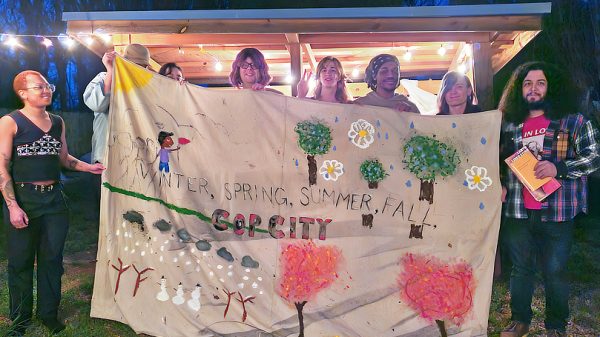
The communist party operated successfully in Georgia until police arrested the fall of the club’s namesake, Angelo Herndon, in 1933 on insurrection charges. Herndon’s arrest came after he led a communist protest outside an Atlanta courthouse, astonishingly bringing together white and Black protesters in the segregated South. Herndon eventually fought his way to the Supreme Court, which granted him freedom in 1937.
McCarthyism in the post-World War two era eradicated CPUSA in 1958. While the group did not reemerge in Georgia until 2022, CPUSA continued to clash with the Libertarian Party of Georgia (LPGA). In 2013, former CPUSA chairman, Sam Webb traveled to Athens, Georgia to debate against Dr. Greg Morin of LPGA inside the University of Georgia’s chapel. Unlike the CPGA, CPUSA will not endorse a political candidate from another party, according to Meade. CPUSA’s youth wing, The Young Communist League (YCL), looks to expand into Georgia and broaden its wing into high school populations. Despite the lack of numbers, Meade highlighted a concept titled the “United Front.” In essence, CPUSA will eventually support any individual as long as the party and the individual’s ideology overlap in at least one area, regardless of the stakeholder’s political or social background.
Defend the Atlanta Forest
While Defend the Atlanta Forest (DTF) holds ties to anarchists and extreme climate activists, the organization does not fall under a specific leadership structure or ideology. DTF mainly operates as a reactionary movement to the construction of Cop City. Movements include political operations that arise for short periods and derive from specific events, such as Atlanta’s deforestation of the Welaunee Forest, a Dekalb County forest that Cop City contractors began tearing down in 2021. DTF attracted local and distant left-wing groups to form movements, according to a petition discovered by Joyner.
DTF protestors occupied a campsite a mile down the road from Cop City in Intrenchment Creek Park in early 2023, camping out and protesting near the construction site of Cop City. This campsite would become the grounds that police officers raided in January 2023 after a spew of violent protests. Amidst the raid, Manuel Esteban Paez Terán, otherwise known as Tortuguita, died after suffering multiple gunshot wounds from police gunfire. DTF used Tortuguita’s death as fuel for the movement, claiming Atlanta’s “militarized” police forces and Cop City would only become stronger and cause harm. The now-abandoned campsite remains obstructed, and police patrol the 85-acre construction site to guard against potential violent protests.
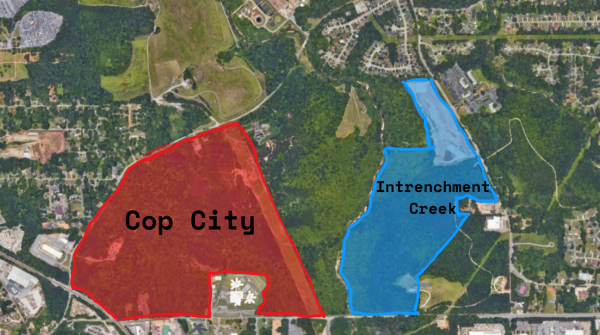
DTF affiliates use techniques similar to the controversial Just Stop Oil movement, such as blocking construction equipment, and roadways and tying themselves to vehicles owned by construction companies. After the wide-scale arrests of protestors at the police training facility and ramped up security forces, DTF lost considerable support from moderate activists. DTF’s media team declined requests to comment on the movement as a whole due to its stance as a decentralized movement.
The left-wing in Georgia rose rather quickly in the wake of 2020’s Black Lives Matter protests and in 2023 after the death of Terán. With the threat of Racketeering charges, DTF and Stop Cop City continue to dwindle out of the mainstream, barring the left from sparking significant change in the state. As for the far-right, the harm brought forth by violent protests resulted in the dispersing of the militia movements that once dominated the alt-right such as the three percent security force.
The crackdowns by Georgia’s law enforcement have silenced extremists and protesters. Cop City, once covered by daily floods of activists, now pushes forward with an untampered construction project. As the far left and right wings shrink, the importance of finding young activists grows. Young adults and teenagers remain essential in the development of extreme politics, which leads to the CPUSA and CPGA targeting younger demographics.
The threat of violence from far-leaning groups remains rather minimal for Georgia citizens and fringe parties continue to demonstrate extreme political beliefs without interruption. The downfall of these organizations comes after strings of violence and arrests scare off former supporters; The events in Charlottesville or the arrests in Cop City resulted in the disbursement of formerly prominent fringe groups. Extremism may grow in a quieter manner than expected, via private online groups and peaceful fringe parties, or extremism may rise again with destruction and violence. With the left and right increasingly distancing from each other, the state of Georgia will further watch its unique political climate evolve into a hotspot for extremist and fringe activism.




